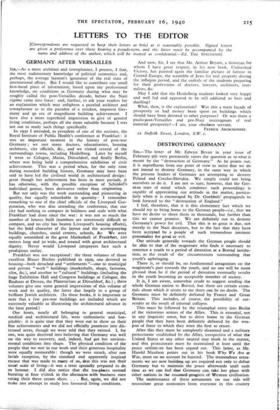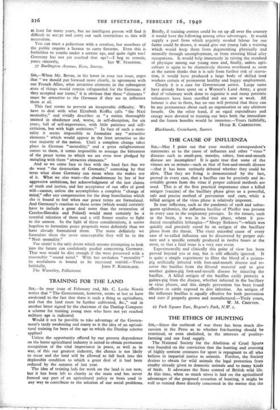DESTROYING GERMANY
SIR,—The letter of Mr. Edwyn Bevan in your issue of February 9th very pertinently raises the question as to what is meant by the " destruction of Germany." As he points out, it is superfluous from our point of view to insist that we do not intend to destroy Germany, in the same way in which the present leaders of Germany are attempting to destroy Poland and Czecho-Slovakia. We simply could not bring ourselves to do it. I am not so sure, however, that the Ger- man state of mind which condones such proceedings is capable of appreciating our attitude in the matter, particu- larly when it is encouraged by Dr. Goebbels' propaganda to look forward to the " destruction of England."
I feel, therefore, that it is this elementary fact which we should try to bring home to the German people—i.e., that we have no desire to shoot them in thousands, but further than this we cannot promise. We are definitely out to destroy Germany's power for evil. That this is so great is due, not merely to the Nazi doctrines, but to the fact that they have been accepted by a people of such tremendous intrinsic potentiality for good or evil.
Our attitude generally towards the German people should be akin to that of the magistrate who finds it necessary to sentence a youth to a period of detention at a Borstal institu- tion, as the result of the circumstances surrounding that youth's upbringing.
There is, or should be, no fundamental antagonism on the magistrate's part towards the youth, and no one will be more pleased than he if the period of detention eventually results in the youth becoming an acceptable member of society.
It is, I am aware, somewhat crude to suggest sending the whole German nation to Borstal, but there are certain essen- tials about which it seems to me there can be no doubt. The Germans must be definitely defeated by France and Great Britain. This includes, of course, the possibility of sur- render as the result of internal collapse.
This must be followed by the triumphal entry into Berlin of the victorious armies of the Allies. This is essential, not in any jingoistic sense, but to drive home to the German people that they have been definitely defeated by the wea- pon of force to which they were the first to resort.
After this they must be completely disarmed and a military protectorate established by the Allies, irrespective of what the United States or any other neutral may think in the matter, and this protectorate must be maintained at least until the peace settlement has been argued out. This latter, as Mr. Harold Nicolson points out in his book Why We Are at War, must on no account be hurried. The tremendous arma- ments we are now building up are required not only to defeat Germany but to maintain the peace afterwards until such time as we can feel .that Germany can take her place with other nations in the resunied-progress of Western civilisation:
The maintenance of these armaments on our side will necessitate great economies from everyone in this country at least for many years, but no intelligent person will find it difficult to acczpt and carry out such restrictions as this will necessitate.
You can trust a policeman with a revolver, but members of the public require a licence to carry firearms. Even this is forbidden to youths under a certain age, and quite right too 1 Germany has not yet reached that age !—I beg to remain,
yours sincerely, IAN W. STANDING. 57 Burlington Avenue, Kew, Surrey.







































 Previous page
Previous page